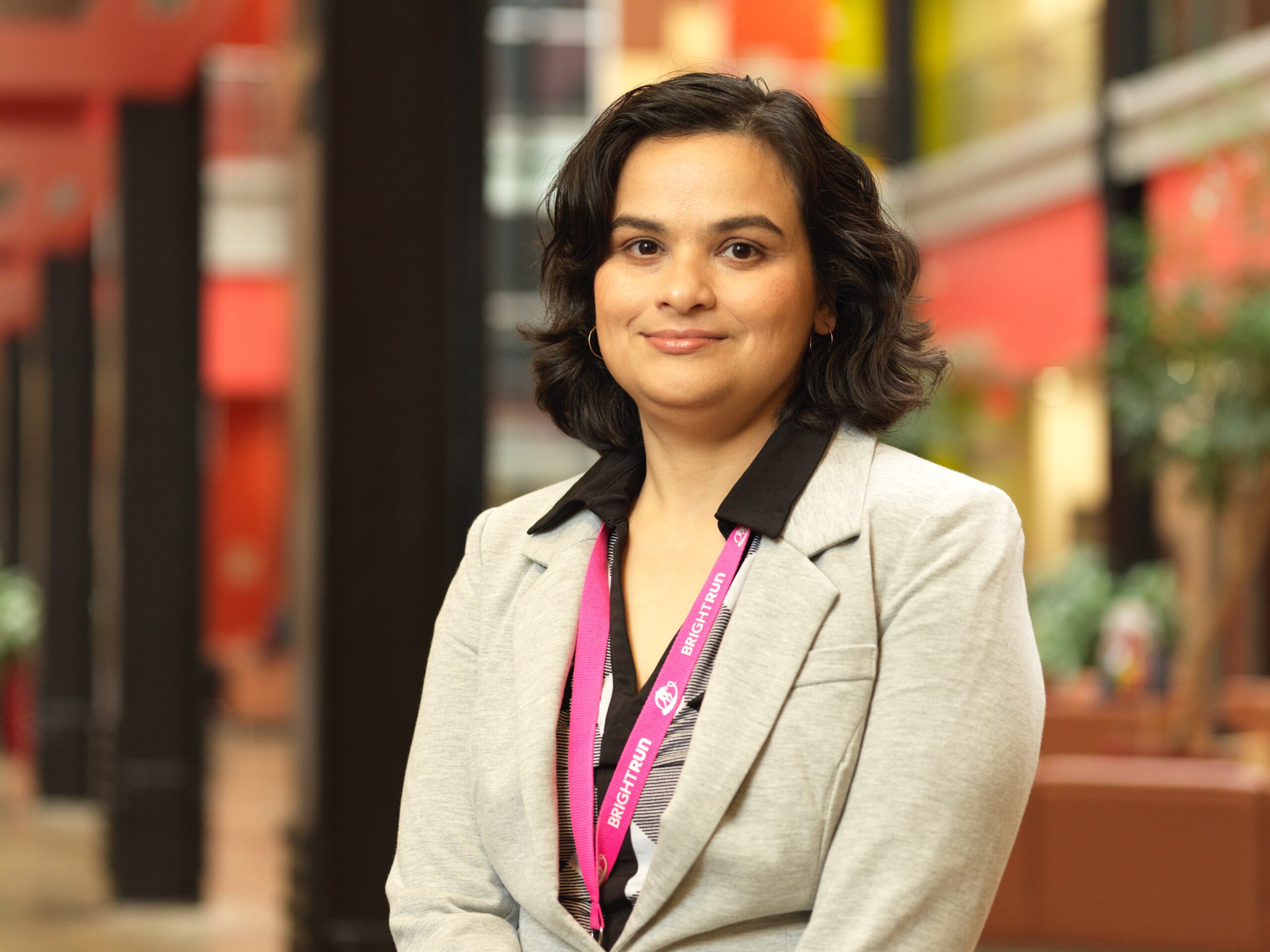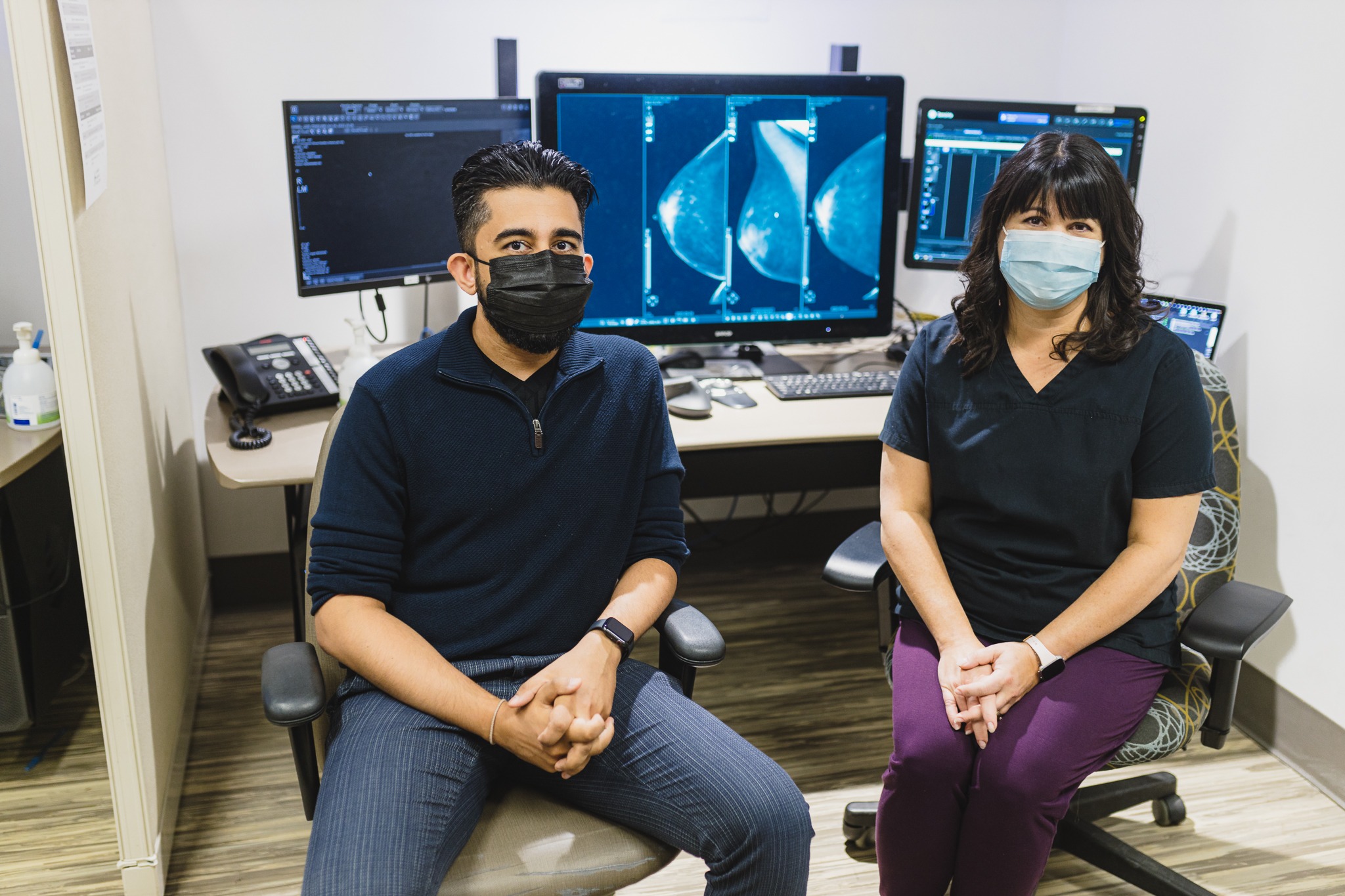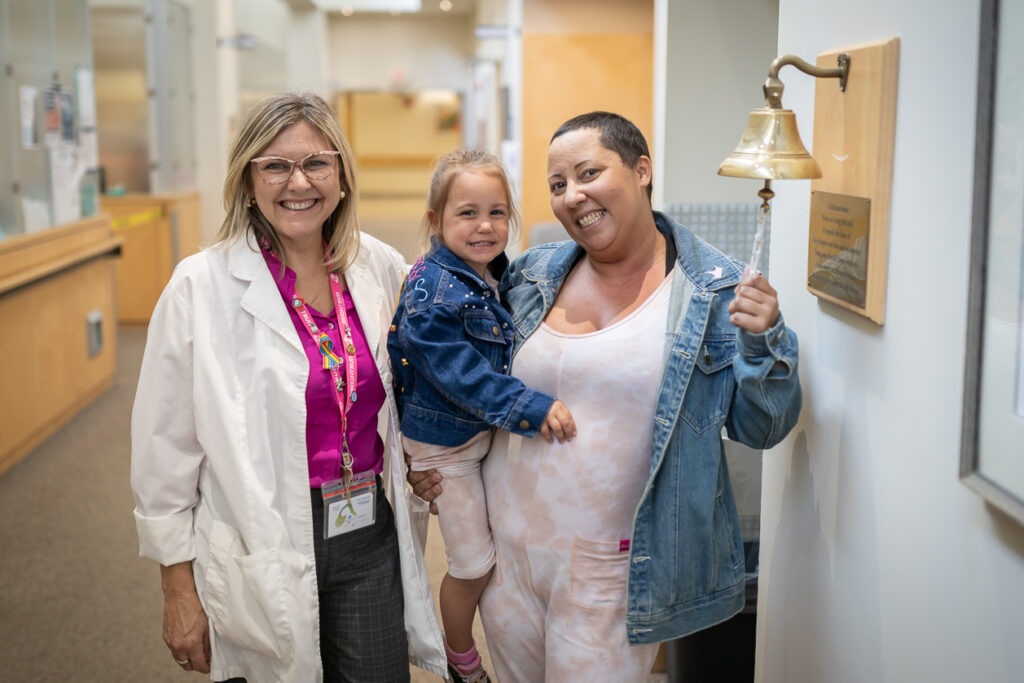
Think PYNK: New program launches for younger breast cancer patients
When Alex Guthrie noticed a breast lump almost one year ago, she suspected a clogged milk duct.
“I had been breastfeeding my daughter for about a year at that point,” says Guthrie, age 37, whose daughter Sadie is now two years old. After a few weeks, when the lump hadn’t gone away, Guthrie booked an appointment with her family doctor who referred to Hamilton Health Sciences (HHS) Juravinski Hospital and Cancer Centre (JHCC) for a closer look. Tests confirmed breast cancer.
“It was a lot to process,” says Guthrie, a busy single mom who works as a Hamilton school bus driver.
Guthrie’s treatment included chemotherapy and surgery followed by radiation, which finished on Oct. 10. She celebrated her last day by ringing the bell in the JHCC’s radiology department with her daughter Sadie and PYNK program coordinator Sandra Turner.
“It has meant a world of difference having this support.” — Alex Guthrie, PYNK program participant
The PYNK program is for younger people diagnosed with breast cancer. Aimed at patients age 40 and under, it launched at JHCC in July through funding from BRIGHT Run in partnership with the Toronto-based Jesin-Neuberger Charitable Foundation. It’s one of three PYNK programs in Ontario, with the others at Toronto hospitals.
“Many young people I have met over the years have expressed the need for the unique services that this program provides,” says Nancy McMillan, BRIGHT Run’s event chair. “Bringing the PYNK program to our cancer centre is truly a very proud moment.”
In the PYNK
Every year, more than 800 new breast cancer patients arrive at JHCC including about 90 under the age of 40. That’s just over 10 per cent of new patients. Since PYNK launched in July, close to 20 JHCC patients have joined the program.
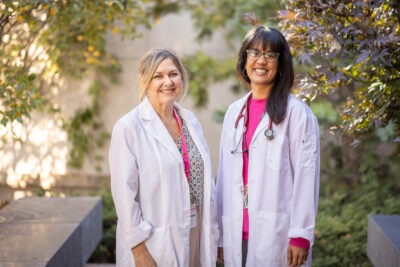
PYNK program coordinator Sandra Turner (left) and Dr. Kumar Tyagi, an oncologist and co-lead of the PYNK program.
Newly-diagnosed breast cancer patients ages 40 and younger are automatically referred to PYNK. Turner, PYNK’s program coordinator, is a highly experienced JHCC oncology nurse. She reaches out to offer support and resources. Participation is optional.
Turner lets patients know what to expect at hospital visits, touches base with them during treatment, listens to their concerns and connects them to a wide range of hospital and community resources. Turner can also connect patients to a virtual support group run by the PYNK program at Toronto’s Sunnybrook Hospital.
Challenges facing younger patients
Younger breast cancer patients face unique concerns, says Dr. Nidhi Kumar Tyagi, medical co-lead for the PYNK program along with Dr. Bindi Dhesy-Thind. Both are HHS oncologists.
“The PYNK program is here to help patients with their goals, which can vary since every patient has unique needs.” — Dr. Kumar Tyagi, co-lead, PYNK program
Younger patients may be trying to manage treatment around school or careers. They may have fertility concerns, or need advice about sharing their diagnosis with their children. Sexual dysfunction and body image issues can be worrisome for younger patients, since treatment may trigger early menopause or involve a mastectomy.
When Guthrie had questions about test results before upcoming appointments with her specialists, Turner helped answer them. Turner connected Guthrie to Hamilton’s Cancer Assistance Program, which offers free services for Hamilton area residents affected by cancer.
“Having Sandra through the PYNK program is like having a close friend in your corner,” says Guthrie. “It has meant a world of difference having this support.”
Thrown off-course
Olivia Gabriele, a Toronto engineer, connected to PYNK after being diagnosed with breast cancer in April at age 27.
Gabriele was training for a marathon when she noticed a small lump under her breast, at the ribs. “I got it checked out as a precaution, but it was definitely a shock when I got a cancer diagnosis,” says Gabriele, who was referred to JHCC because she grew up in the Hamilton area and her family doctor is here.
Turner helped Gabriele find information on concerns including reproductive health and breast reconstruction. “When you’re first diagnosed, there’s so much information coming at you,” says Gabriele. “It’s easy to get lost in the system without support from someone like Sandra.”
PYNK Progress
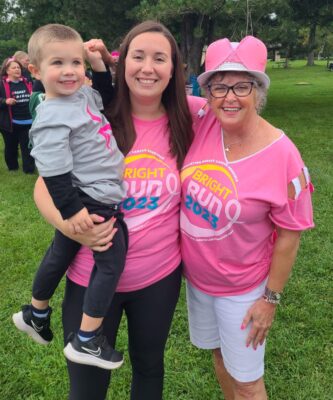
Victoria O’Connor was this year’s BRIGHT Run survivor spokesperson. She is pictured here with her son, Miles, and event chair Nancy McMillan.
Victoria O’Connor, 31, of Brantford, didn’t have a program like PYNK when she was diagnosed with breast cancer several years ago at age 23.
“My dream was to have a career, get married and have children. But because of my cancer diagnosis all of that was put on hold,” says O’Connor, BRIGHT Run’s 2023 breast cancer survivor spokesperson.
As well as focusing on treatment, she was trying to figure out how to continue with her Mohawk College paralegal program. O’Connor and her boyfriend, now her husband, also had questions about whether they could someday start a family and weren’t sure where to turn for answers. Fortunately, they were able to get pregnant after her treatment and they now have two young children. Body image was another concern, says O’Connor, who lost her hair during treatment and had a breast removed.
“I’m sure it’s a lot to deal with at any age, but because I was so young it was very hard for me. I wish the PYNK program had been available when I was diagnosed and going through treatment, but I’m very happy that it’s available now for other young cancer patients.”

